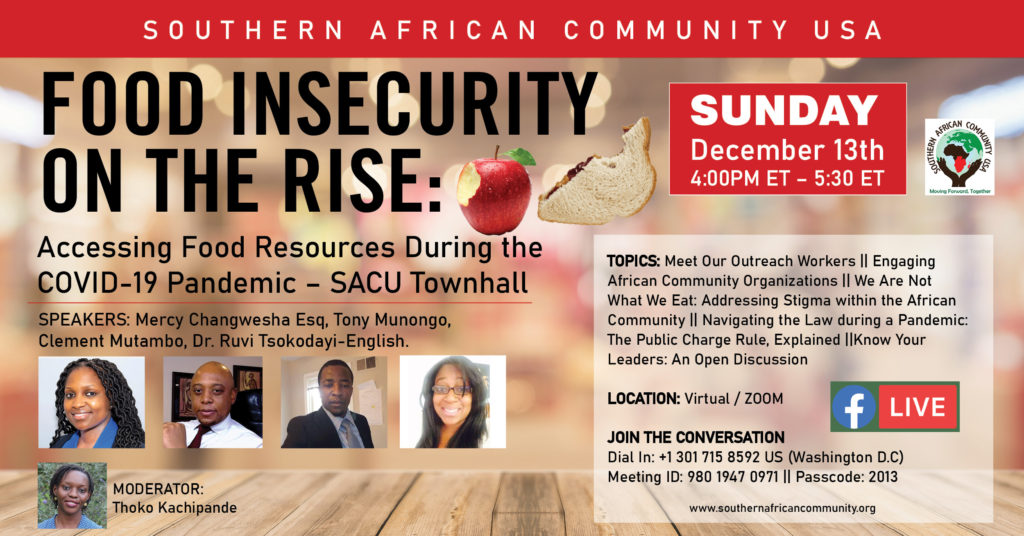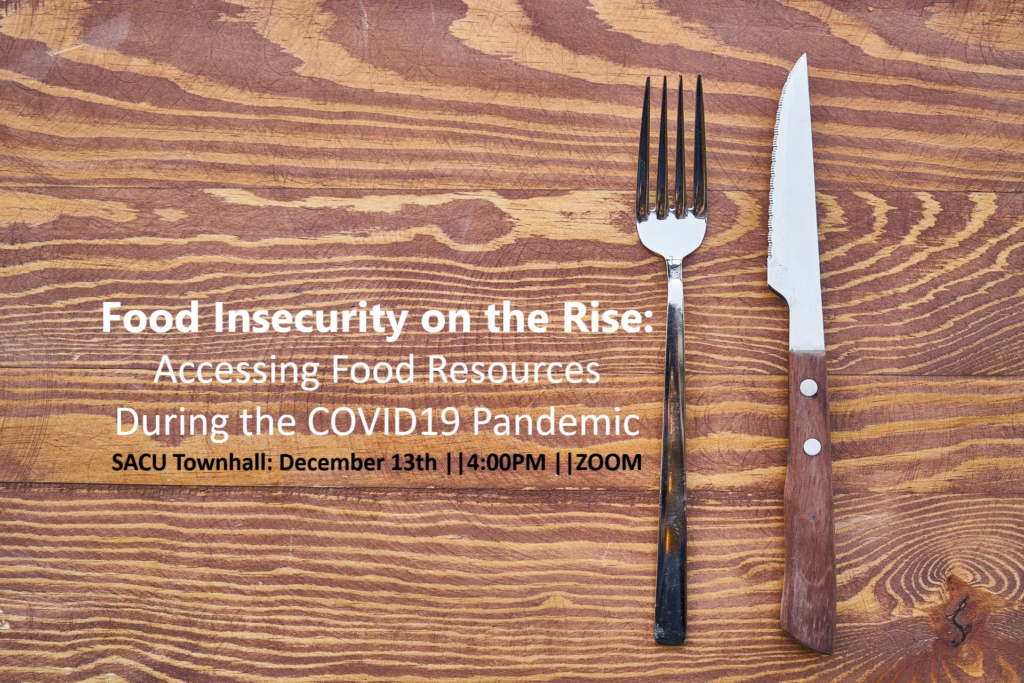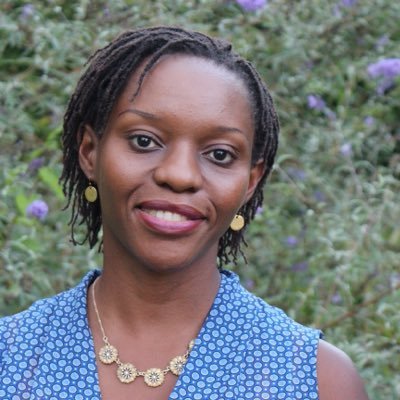
Join the African Diaspora from Southern Africa for an interactive discussion addressing how COVID-19 is impacting food security in our communities and accessing food resources.
WHEN: December 13th || TIME: 4:00PM ET – 5:30 ET
TOPICS: Meet Our Outreach Workers || Engaging African Community Organizations || We Are Not What We Eat: Addressing Stigma within the African Community || Navigating the Law during a Pandemic: The Public Charge Rule, Explained ||Know Your Leaders: An Open Discussion
SPEAKERS: Mercy Changwesha Esq, Tony Munongo, Clement Mutambo, Dr. Ruvi Tsokodayi-English.
MODERATOR: Thoko Kachipande
Event Video
If you missed the event, you can watch the full town hall discussion by clicking the video below.
Schedule:
Welcome: Cassandra Sibanda, SACU Director
Introduction: Thoko Kachipande, Moderator
Meet Our Outreach Workers, Bernadette, Henri, Kenga
Engaging African Community Organizations, Clement Mutambo , Tony Munongo
We Are Not What We Eat: Addressing Stigma within the African Community, Ruvi Tsokodayi-English
Navigating the Law during a Pandemic: The Public Charge Rule, Explained, Mercy Changwesha
Know Your Leaders: An Open Discussion
Q & A

TOPIC SUMMARY
Introduction
Meet our host, about SACU, Food insecurity in the U.S. and the SACU – Manna Food Partnership.
Cassandra Sibanda and Thoko Kachipande
Meet Our Outreach Workers
Introduction of outreach workers from SACU who are working with people in our community to provide resources for SACU’s partnership with Manna Food Center. Outreach workers will share their perspectives on working with Africans that are currently or may be at risk of being food insecure.
Bernadette Mpaluko, Henri Maindidze, Kenga Chaplain, SACU Southern African Community Outreach Workers
Engaging African Community Organizations
Southern African leaders from D.C. area organizations discuss the role that home country associations and organization can play in providing resources for social safety nets like food insecurity and other needs. They will highlight why it is important that these organizations get actively involved in addressing the needs of their local communities and why it is important for them to work together to address common concerns.
Clement Mutambo, President, Association of Zambians in the D.C, Maryland and Virginia (AZDMV) Tony Munongo, TudiTuri Initiative
We Are Not What We Eat: Addressing Stigma within the African
This topic will discuss the real and/or perceived stigma that African immigrants to the U.S. face in society when it comes to accessing social safety nets such as food assistance. It will address the real or perceived social-cultural source of that stigma by Americans, Africans, and Diaspora Africans and will suggest steps we can take to overcome this stigma.
Dr. Ruvi Tsokodayi-English, Senior Research Analyst, Office of Accountability – Charlotte Mecklenburg Schools
Navigating the Law during a Pandemic: The Public Charge Rule, Explained
This topic will discuss social safety nets and the legal system. Specifically, it will focus on the current public charge laws. Under the public charge rule, immigrants to United States may be denied visas or permission to enter the country due to their disabilities or lack of economic resources. However, it does not apply to everyone. Our legal expert will discuss when these laws are applicable, to whom they apply to and if they impact food assistance recipients.
Mercy Changwesha, ESQ, Attorney, The Law Office of Mercy Changwesha
SPEAKER PROFILES
Panelists
Moderator
Thoko Kachipande Prenatt

Thoko Kachipande-Prenatt is a Malawian-American with a passion for promoting a balanced presentation of African culture, history, and news. She spent most of her formative years in Germany and South Africa before settling in the U.S. Kachipande has worked in non-profit and health science industries for over a decade. She is a career healthcare and science communication professional who holds an M.A. in Communication from Johns Hopkins University and a social science undergraduate degree focusing on African/African-American studies. When it comes to journalism and writing, she likes to remember that “history is written by the winners and those who bother to write” (Winston Churchill/George Orwell).